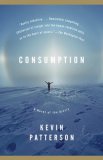Summary | Excerpt | Reading Guide | Reviews | Beyond the Book | Readalikes | Genres & Themes | Author Bio

Chapter One
Storms are sex. They exist alongside and are indifferent to words and description and dissection. It had been blizzarding for five days and Victoria had no words to describe her restlessness. Motion everywhere, even the floors vibrated, and such motion was impossible to ignore, just as it was impossible not to notice the squeaking walls, the relentless shuddering of the wind. Robertson was in Yellowknife, and she and the kids had been stuck in this rattling house for almost a week, the tundra trying to get inside, snow drifting higher than the windows, and everyone inside the house longing to be out.
It was morning, again, and she was awake and so were the kids, but they had all stayed in bed and listened to the walls shake. Nine, or something like that, and still perfectly black. She had been dreaming that she was having sex with Robertson. She was glad she had woken up. Even the unreal picture of it had left her feeling alarmed—though that eased as the image of the two of them, entwined, had faded. In another conscious moment she was able to blink the topic away and out of her thoughts. As it had been.
She could hear her girls, Marie and Justine, whispering to each other in their bedroom. She couldn’t tell what they were saying. She heard the word “potato.” Pauloosie, her son, her oldest child, was silent. She listened carefully and thought she could hear him turning in his bed. And then the wind wound up and just howled.
As a girl she had not been this restless, waiting out storms with her parents on the land in a little iglu, drinking sweet tea and lying on caribou skins. It had been more dangerous then but less frightening. Storms make an iglu feel more substantial somehow. This house, on the other hand, felt as if it were about to become airborne, and it would have if not for the bolts tethering it to its pilings. It had been made in Montreal, of particleboard and aluminum siding, before being shipped by barge to Hudson Bay, sagging from square with each surge of the sea. Where the door frame gapped away from the kitchen door, snow sprayed through in parabolas. These wee drifts persisted as long as the door stayed closed. After five days they seemed as permanent as furniture. The wind whistling under the house kept the kitchen floor nearly as cold as the stone beneath it.
That stone slid, in its turn, through the town, to the shore, and then under the ice of Hudson Bay, angling shallowly out into the sea basin like a knife slipping between skin and meat. And on top of that water was ice, a quarter million square miles of it, arid and flat and sucking in the frigid air from the High Arctic like a bellows—blowing it down through Rankin Inlet and into the rest of the unmindful continent. Chicago would be Rome but for this frozen ocean, not that its significance is known to anyone who doesn’t live alongside it.
Rankin Inlet, Repulse Bay, Baker Lake, Coral Harbour, Whale Cove: variations on the theme of shelter from the sea, each of these hamlets lies on the west coast of Hudson Bay, named by nineteenth–century whalers seeking safety. The smallest is a couple hundred people and the largest of these, Rankin Inlet, is two thousand, almost all Inuit, with a handful of southerners, Kablunauks, among them.
The people exist along this coast against a backdrop of a half million square miles of tundra, gently rolling treeless plains. In the summer, this land is boggy and moss–bound; in the winter, frozen and blasted lowlands, eskers of rock protruding through shallow snow. The Inuit lived here for ten thousand years, pulling their living from this meager forage until the 1960s, when they accreted in the little government towns built along the coast and left the tundra empty of human inhabitants for the first time since the glacial ice had melted.
Victoria and Robertson had been married a year when Robertson paid to have this house shipped here for his new family to live in. It was twice the size of the housing department shacks offered to the rest of the community; this benefit of marrying a Kablunauk had been remarked upon in Victoria’s presence since the house had floated its way to the bay at the edge of the town. The other young families were crowded into the back rooms of their relatives’ cramped houses, and privacy such as Victoria knew was considered an uncommon luxury.
Excerpted from Consumption by Kevin Patterson Copyright © 2007 by Kevin Patterson. Excerpted by permission of Nan A. Talese, a division of Random House, Inc. All rights reserved. No part of this excerpt may be reproduced or reprinted without permission in writing from the publisher.
Your guide toexceptional books
BookBrowse seeks out and recommends the best in contemporary fiction and nonfiction—books that not only engage and entertain but also deepen our understanding of ourselves and the world around us.